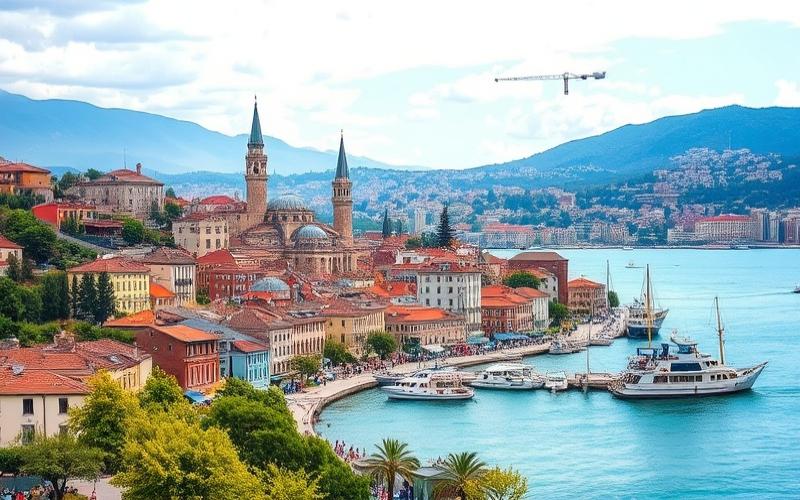
 Published on and written by Cyril Jarnias
Published on and written by Cyril Jarnias
Embarking on expatriation in Turkey opens the door to a multitude of professional opportunities, but it also presents the challenge of integrating into a new cultural and professional environment. To succeed in your immersion, developing a robust professional network proves crucial. This article aims to unveil valuable strategies for expatriates to successfully navigate the dynamic Turkish market, where interpersonal relationships hold a central place. From mastering local cultural specifics to using digital platforms and professional events, discover how to broaden your horizons and strengthen your professional presence in this country at the crossroads of continents.
Identifying Relevant Professional Events in Turkey
| Sector | Event / Trade Show | Location | Timing | Access / Registration | Description / Specifics |
|---|---|---|---|---|---|
| Automotive | Automechanika Istanbul | Istanbul | Annual, May or June | Professional only, registration via official website | Largest automotive aftermarket trade show, strategic meeting point between Europe and Asia. Workshops, conferences, product launches, international networking. |
| JOJO Expo Antalya | Antalya / Adana | Annual | B2B trade show platforms, advance registration | Trade show dedicated to caravans, equipment, and automotive tourism. | |
| Textile | ITM (International Textile Machinery) | Istanbul | Biennial, June | Registration on official website | Leading trade show for the textile industry, machinery, technologies, and innovations. |
| Food & Agriculture | WorldFood Istanbul | Istanbul | Annual, September | Open to professionals, online registration | International food and agriculture fair, bringing together producers, importers, distributors. |
| Information Technology | ICT Summit Now Eurasia | Istanbul | Annual, October | Registration via event website | Major IT conferences on digital transformation, artificial intelligence, cybersecurity. |
| CeBIT Bilişim Eurasia | Istanbul | (Historical, awaiting resumption) | Specialized IT platforms | Former flagship new technologies trade show, IT networking. |
Professional Networking Events, Meet-ups, and Workshops:
International Chambers of Commerce (French, German, American, British, etc.)
Regularly organize:
- Sector-specific workshops
- Thematic seminars
- Networking evenings and after-work events for entrepreneurs, expatriates, and decision-makers
Frequency: Monthly or quarterly depending on the chamber
Registration:
- Official chamber websites (CCI France Turkey, AHK Türkei, AmCham Turkey…)
- Event platforms like Eventbrite, Meetup, LinkedIn Events
Entrepreneur and Expatriate Networks in Istanbul and Ankara
Event examples:
- Startup Grind Istanbul (meetups for startups and investors)
- Istanbul Expat Community (social and professional events)
- Sector-specific workshops in incubators (KWORKS, ITU ARI Teknokent)
Where to find information and register:
- Meetup.com (groups like “expats Istanbul,” “entrepreneurs Turkey”)
- LinkedIn pages of local ecosystems
- Incubator or accelerator newsletters
Participation Procedures and Tips:
- Online registration: Almost all trade shows and conferences require advance registration via their official website or a B2B platform.
- Restricted access: Most major sector-specific trade shows are exclusively accessible to professionals or by invitation.
- Language: English is generally the working language at international events, but proficiency in Turkish is an asset for local networking.
- Preparation: It’s recommended to prepare business cards and review the list of exhibitors/speakers to optimize networking.
- Follow-up: Subscribe to newsletters from major trade shows, chambers of commerce, and incubators to be informed in advance of dates and access procedures.
Recommended Registration and Information Platforms:
- Official trade show websites (e.g., automechanika-istanbul.tr.messefrankfurt.com)
- Eventbrite and Meetup for networking events
- LinkedIn (events, chamber of commerce pages, incubators)
- Sector-specific newsletters and professional WhatsApp/Telegram groups
Participating in these events is essential for building a strong network in Turkey and accessing the latest sector trends.
Good to Know:
To develop your professional network in Turkey, identify key events like the Istanbul International Fair for the textile industry or the Bursa Automotive Fair, which take place in October and May respectively. The Kayseri Food and Agriculture Fair, usually in November, is ideal for agricultural professionals, while the IT Network Turkey summit, often in April, offers opportunities in the information technology sector. For networking, the British and American chambers of commerce regularly organize bilingual meet-ups and workshops in Istanbul and Ankara, targeting expatriates and local entrepreneurs. Check the websites of international chambers of commerce and platforms like Eventbrite to register for these events. Participation is often open, but advance registration is required, and some events offer discounts for early booking.
Joining International and Local Associations
Engaging with international and local professional associations in Turkey is a key lever for expanding your network, accelerating your integration, and succeeding in the Turkish professional environment.
Opportunities Offered by Professional Associations:
- Access to a broad network of local and international professionals.
- Participation in networking events (conferences, seminars, workshops).
- Development of specific skills through training and specialized workshops.
- Understanding the specifics of the Turkish market, its practices, and business culture.
- Access to updated sector information and exclusive business opportunities.
Examples of Active Associations in Turkey by Sector:
| Sector | Main Association | Description |
|---|---|---|
| Insurance | Insurance Association of Türkiye | Support, development, and regulation of the insurance sector |
| Food & Agriculture | Turkish Milk, Meat, Food Industrialists and Producers Association (SETBİR) | Represents major players in the food industry |
| Intellectual Property | Licensing Executives Society Turkey (LES Turkey) | Technology management and transfer, intellectual property |
| International Trade | TÜGİDER (All Foods Foreign Trade Association) | Promotion of food foreign trade |
| Francophonie and Expatriates | Union of French Abroad, Franco-Turkish Association | Support for expatriates and intercultural links |
| NGOs and Non-Profit Sector | Varied list of local and international NGOs | Social, environmental, educational actions, etc. |
Membership Procedure and Benefits:
- Online registration via the association’s official website.
- Participation in an initial meeting or welcome event.
- Possible payment of an annual membership fee.
- Immediate access to the member platform, discussion groups, and event calendar.
- Benefit from support for new members (mentoring, support groups).
Facilitation of Professional Integration:
- Direct connection with key sector players.
- Recommendations and references for career or partnership opportunities.
- Rapid adaptation to local codes and professional practices.
- Increased visibility with Turkish companies and institutions.
Non-Professional Benefits:
- Invitation to cultural, sports, and social events organized by the association.
- Access to clubs, discussion circles, and specific interest groups.
- Support with settling in (housing, administrative procedures, daily life).
- Volunteering opportunities and contribution to civic actions.
Getting involved in a professional association in Turkey not only accelerates your career development but also enriches your social, cultural, and human experience within a dynamic and international environment.
Good to Know:
Engaging with international and local professional associations is crucial for expanding your network in Turkey; it not only offers networking opportunities but also professional development and understanding of the Turkish market’s specifics. For example, the International Chamber of Commerce, the Turkish Industry and Business Association (TÜSİAD), or the Franco-Turkish Chamber of Commerce are essential platforms for connecting with sector experts and opinion leaders. Joining these organizations facilitates integration into the Turkish professional environment by offering workshops, conferences, and training that enrich skills. Moreover, these associations often propose cultural and social events that help with social integration and better understanding of the local culture. Active participation in these networks can also reveal opportunities to collaborate on projects or community initiatives, thereby strengthening your professional and personal position in Turkey.
Understanding Turkish Business Etiquette
Overview of cultural norms and professional practices in Turkey
Formal Greetings
A professional greeting begins with a firm handshake, accompanied by direct eye contact. It is imperative to use appropriate honorifics: “Bey” (Mr.) for men and “Hanım” (Mrs./Ms.) for women, preceded by the first or last name. Professional titles (Doktor, Avukat, Müdür…) are also highly respected.
Professional Networking Practices
Networking relies on the gradual building of interpersonal relationships. Trust develops over time and through regular exchanges. Social events (lunches, coffees) are essential for establishing these connections.
Role of Personal Relationships in Business
Human relationships are at the heart of the Turkish professional world; it is common for friendship to precede or accompany business relationships.
- Showing personal interest in your interlocutors strengthens trust.
- Long-term loyalty often prevails over commercial opportunism.
- Turkish hospitality encourages informal exchange before any formal negotiation.
Appropriate Dress Code
| Situation | Recommended Attire |
|---|---|
| Formal meeting | Dark suit, tie |
| Daily office | Classic and neat attire |
| Women | Modest dress or suit |
Simplicity and professionalism are paramount; avoid casual or flashy attire.
Punctuality
- Arriving on time for appointments is expected, but flexibility remains possible during internal meetings.
- When hosting a foreign guest, some tolerance exists for potential delays—but it’s preferable to be punctual out of respect.
Protocol During Business Meetings
- Respect hierarchy: Wait your turn to speak; address the senior person present first.
- Exchange business cards at the beginning; present your card carefully.
- Participate in the offered convivial moments: tea/coffee offered before each meeting as a welcome gesture.
Differences Between Turkey and Western Cultures
| Aspect | Turkey | West |
|---|---|---|
| Business Relations | Priority given to personal connections | Focus on quick transactions |
| Hierarchy | Very pronounced | Often more horizontal |
| Communication | Indirect; importance of non-verbal | Direct |
| Gifts | Appreciated if moderate | Less common |
These differences influence how lasting partnerships are formed: in Turkey, patience and personal involvement are often necessary before any contractual conclusion.
Practical Tips for Expatriates
- Always adopt a respectful tone; systematically use titles until explicitly invited to do otherwise.
- Carefully prepare your attire for initial contacts.
- Accept all proposals related to local hospitality (coffee/tea).
- Take time to get to know your interlocutors outside strictly professional contexts.
- Avoid any sensitive political comments during informal discussions.
Respecting these codes greatly favors successful professional integration in Turkey.
Good to Know:
In Turkey, business etiquette is rooted in formal greetings, such as shaking hands while maintaining eye contact, often adding “Bey” or “Hanım” after the first name to show respect. Attire should be neat, with dark suits for men and elegant but modest outfits for women. Punctuality is appreciated, but some flexibility is accepted, as meetings may start later than scheduled. Personal relationships play a crucial role in business, meaning it’s essential to take time to get to know your counterparts. Unlike Western cultures where individualism prevails, the collective and family networks are often at the heart of business relationships in Turkey. It’s also common to exchange business cards, but only with the right hand, and to show patience during negotiations, which may take time due to preliminary discussions on various topics to establish a connection. For expatriates, being aware of these differences and demonstrating cultural flexibility can greatly facilitate the establishment of strong and lasting professional relationships.
Establishing Lasting Multicultural Relationships
Understanding Turkish cultural norms and mastering intercultural communication are essential levers for successful professional networking in Turkey. Turkish society values hospitality, human warmth, and a relational approach where every interaction, even minor, contributes to building lasting bonds.
Key Points of Intercultural Communication in Turkey:
- Prioritize active listening and a respectful tone.
- Value silence when appropriate.
- Adopt open but measured body language (sustained eye contact without excessive insistence, moderate gestures).
- Use specific polite phrases like “Hoş geldiniz” or “afiyet olsun” during informal or professional exchanges.
- Prefer criticisms formulated gently and diplomatically.
The impact of authentic relationships on networking manifests in the preference given to partners with whom mutual trust has been established. Business often materializes after several informal meetings (shared meals, coffee invitations), these moments being perceived as foundational to a solid collaboration.
| Key to Success | Impact on Professional Relationships |
|---|---|
| Hospitality | Strengthens mutual trust |
| Flexible Punctuality | Shows cultural flexibility |
| Small Gifts | Demonstrates consideration without material excess |
| Respect for Elders | Values experience within the network |
Concrete Examples of Success:
- An international company that facilitated its local establishment by regularly organizing culinary events bringing together clients, partners, and collaborators around Turkish specialties.
- A foreign law firm that managed to retain its clientele thanks to a multilingual team actively participating in local national and religious holidays.
To Maintain These Relationships Long-Term:
List of Practical Tips:
- Stay proactive in exchanges (occasional messages during national/religious holidays).
- Regularly propose physical or virtual meetings depending on availability.
- Continuously inform yourself about local cultural evolution to adjust behaviors if needed.
Suggestions to Strengthen Your Presence:
Participation in Local/International Events in Turkey:
- Regional economic forums
- Sector-specific trade shows (textile industry, technologies…)
- Multicultural association meetings
Importance of Learning Turkish:
- Mastering a few common phrases greatly facilitates initial contacts.
- Showing linguistic effort is always appreciated.
Social Media & Professional Platforms:
- LinkedIn to maintain your international professional contacts.
- Instagram & Twitter/X to follow your local partners.
- WhatsApp/Telegram groups dedicated to expatriates or foreign entrepreneurs.
Frame every interaction with sincere listening, cultural respect, and a manifest willingness to integrate: it is this approach that transforms every contact into a genuine, lasting opportunity.
Good to Know:
Understanding Turkish cultural norms, such as respect for hierarchy and the importance of family, as well as mastering intercultural communication, are essential for establishing authentic and lasting professional relationships in Turkey. These authentic relationships can greatly influence your professional success by providing privileged access to local information and opportunities. An example of success is an expatriate who managed to create a strong network by regularly participating in local and international business events like the Istanbul Economy Summit. Learning the Turkish language shows your commitment to the local culture and facilitates interactions. Using professional networking platforms like LinkedIn to maintain contact with your multicultural relationships is crucial, but don’t forget to nurture these relationships by proposing collaborations or regular meetings to solidify these bonds.
Disclaimer: The information provided on this website is for informational purposes only and does not constitute financial, legal, or professional advice. We encourage you to consult qualified experts before making any investment, real estate, or expatriation decisions. Although we strive to maintain up-to-date and accurate information, we do not guarantee the completeness, accuracy, or timeliness of the proposed content. As investment and expatriation involve risks, we disclaim any liability for potential losses or damages arising from the use of this site. Your use of this site confirms your acceptance of these terms and your understanding of the associated risks.

























































